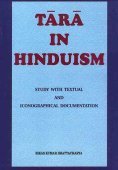Vamacara, Vāmācāra, Vama-acara: 10 definitions
Introduction:
Vamacara means something in Hinduism, Sanskrit, Marathi, Hindi. If you want to know the exact meaning, history, etymology or English translation of this term then check out the descriptions on this page. Add your comment or reference to a book if you want to contribute to this summary article.
Alternative spellings of this word include Vamachara.
In Hinduism
Shaktism (Shakta philosophy)
Source: Google Books: ManthanabhairavatantramVāmācāra (वामाचार) refers to the “practice of the left”.—The goddess is called Vāmā because she practices ‘vāmācāra’. In this context vāmācāra—the ‘practice of the left’—denotes her dynamism within the Liṅga where, rotating through it in an anticlockwise spiral, she energises her phonemic energies within it. She impels herself by the rotation within herself in the same direction, which is that of emanation, whilst in her fertile seed state, which is at once Divine Light and Sound.

Shakta (शाक्त, śākta) or Shaktism (śāktism) represents a tradition of Hinduism where the Goddess (Devi) is revered and worshipped. Shakta literature includes a range of scriptures, including various Agamas and Tantras, although its roots may be traced back to the Vedas.
General definition (in Hinduism)
Source: WikiPedia: HinduismVāmācāra (वामाचार) is a Sanskrit term meaning "left-handed attainment" and is synonymous with "Left-Hand Path" or "Left-path" (Sanskrit: Vāmamārga). It is used to describe a particular mode of worship or sadhana (spiritual practice) that is not only "heterodox" (Sanskrit: nāstika) to standard Vedic injunction, but extreme in comparison to the status quo.
These practices are often generally considered to be Tantric in orientation. The converse term is dakṣiṇācāra "Right-Hand Path", which is used to refer not only to "orthodox" (Āstika) sects but to modes of spirituality that engage in spiritual practices that not only accord with Vedic injunction but are generally agreeable to the status quo.
Left-handed and right-handed modes of practice may be evident in both orthodox and heterodox schools of Indian religions such as Hinduism, Jainism, Sikhism and Buddhism and is a matter of taste, culture, proclivity, initiation, sadhana and dharmic "lineage" (parampara).
Languages of India and abroad
Marathi-English dictionary
Source: DDSA: The Molesworth Marathi and English Dictionaryvāmācāra (वामाचार).—m S One of the two divisions of the śākta -worship,--the left-hand-form. Opp. to dakṣiṇā- cāra q. v.
Marathi is an Indo-European language having over 70 million native speakers people in (predominantly) Maharashtra India. Marathi, like many other Indo-Aryan languages, evolved from early forms of Prakrit, which itself is a subset of Sanskrit, one of the most ancient languages of the world.
Sanskrit dictionary
Source: DDSA: The practical Sanskrit-English dictionaryVāmācāra (वामाचार).—the left-hand ritual or doctrine of the Tantras; the doctrine of resorting to मांस, मद्य, मत्स्य, मैथुन (māṃsa, madya, matsya, maithuna) and मुद्रा (mudrā).
Derivable forms: vāmācāraḥ (वामाचारः).
Vāmācāra is a Sanskrit compound consisting of the terms vāma and ācāra (आचार). See also (synonyms): vāmamārga.
Source: Cologne Digital Sanskrit Dictionaries: Shabda-Sagara Sanskrit-English DictionaryVāmācāra (वामाचार).—m.
(-raḥ) The doctrine of the Tantras according to one system. E. vāma left, and ācāra institute; the left hand ritual, the use of flesh, spirits, &c., forming part of the Vamachara ceremonies.
Source: Cologne Digital Sanskrit Dictionaries: Monier-Williams Sanskrit-English Dictionary1) Vāmācāra (वामाचार):—[from vāma] m. the left-hand practices or doctrines of the Tantras (id est. the worship of the Śakti or Female Energy personified as the wife of Śiva, as opposed to dakṣiṇācāra q.v.), [Catalogue(s)]
2) [v.s. ...] mfn. behaving badly or in the wrong way, [Suśruta; Pañcarātra]
Source: Cologne Digital Sanskrit Dictionaries: Yates Sanskrit-English DictionaryVāmācāra (वामाचार):—[vāmā+cāra] (raḥ) 1. m. Left hand system; using flesh, spirits, &c.
[Sanskrit to German]
Sanskrit, also spelled संस्कृतम् (saṃskṛtam), is an ancient language of India commonly seen as the grandmother of the Indo-European language family (even English!). Closely allied with Prakrit and Pali, Sanskrit is more exhaustive in both grammar and terms and has the most extensive collection of literature in the world, greatly surpassing its sister-languages Greek and Latin.
Hindi dictionary
Source: DDSA: A practical Hindi-English dictionaryVāmācāra (वामाचार):—(nm) a Tantrik cult; ~[rī] an adherent of [vāmācāra].
...
Kannada-English dictionary
Source: Alar: Kannada-English corpusVāmācāra (ವಾಮಾಚಾರ):—
1) [noun] an immoral, unsocial, evil course or manner.
2) [noun] the left-hand practices or following doctrines of the tantras, observing extreme actions such as eating human flesh, having sexual enjoyments etc. as a mode of worship of Śakti.
3) [noun] use of magicalthat harness occult forces or evilto produce evil and unnatural effects in the world; black-magic; witchcraft.
Kannada is a Dravidian language (as opposed to the Indo-European language family) mainly spoken in the southwestern region of India.
See also (Relevant definitions)
Starts with: Vamacarasiddhanta.
Ends with: Evamacara.
Full-text (+4): Vamamarga, Vamacarin, Takshinacaram, Vamagama, Vamacari, Vamadevi, Dakshinacara, Vami, Kula, Cakrapuja, Shakta, Vama, Apasavyamarga, Viragoshthi, Goshthi, Viragoshthipriya, Viramata, Margastha, Savyamarga, Apasavya.
Relevant text
Search found 7 books and stories containing Vamacara, Vama-acara, Vāma-ācāra, Vāmācāra; (plurals include: Vamacaras, acaras, ācāras, Vāmācāras). You can also click to the full overview containing English textual excerpts. Below are direct links for the most relevant articles:
Kamashastra Discourse (Life in Ancient India) (by Nidheesh Kannan B.)
3. Tāntric Sexuality < [Chapter 5 - Looking for Alternatives: Possibilities in Kāmaśāstra]
Shakti and Shakta (by John Woodroffe)
Chapter VI - Śakti and Śākta < [Section 1 - Introductory]
Chapter XII - Alleged conflict of Śāstras < [Section 1 - Introductory]
Chapter IX - The Tantra-śāstras in China < [Section 1 - Introductory]
Amarakoshodghatana of Kshirasvamin (study) (by A. Yamuna Devi)
Religion, Religious Myths and Legends (Introduction) < [Chapter 4 - Cultural Aspects]
Varahi Tantra (English Study) (by Roberta Pamio)
Chapter 22 - The the Six Āmnāyas < [Summary of the Vārāhī Tantra]
The Devi Bhagavata Purana (by Swami Vijñanananda)
The Padma Purana (by N.A. Deshpande)
Chapter 71 - Viṣṇu’s One Thousand Names (Viṣṇusahasranāma) < [Section 6 - Uttara-Khaṇḍa (Concluding Section)]
Related products

